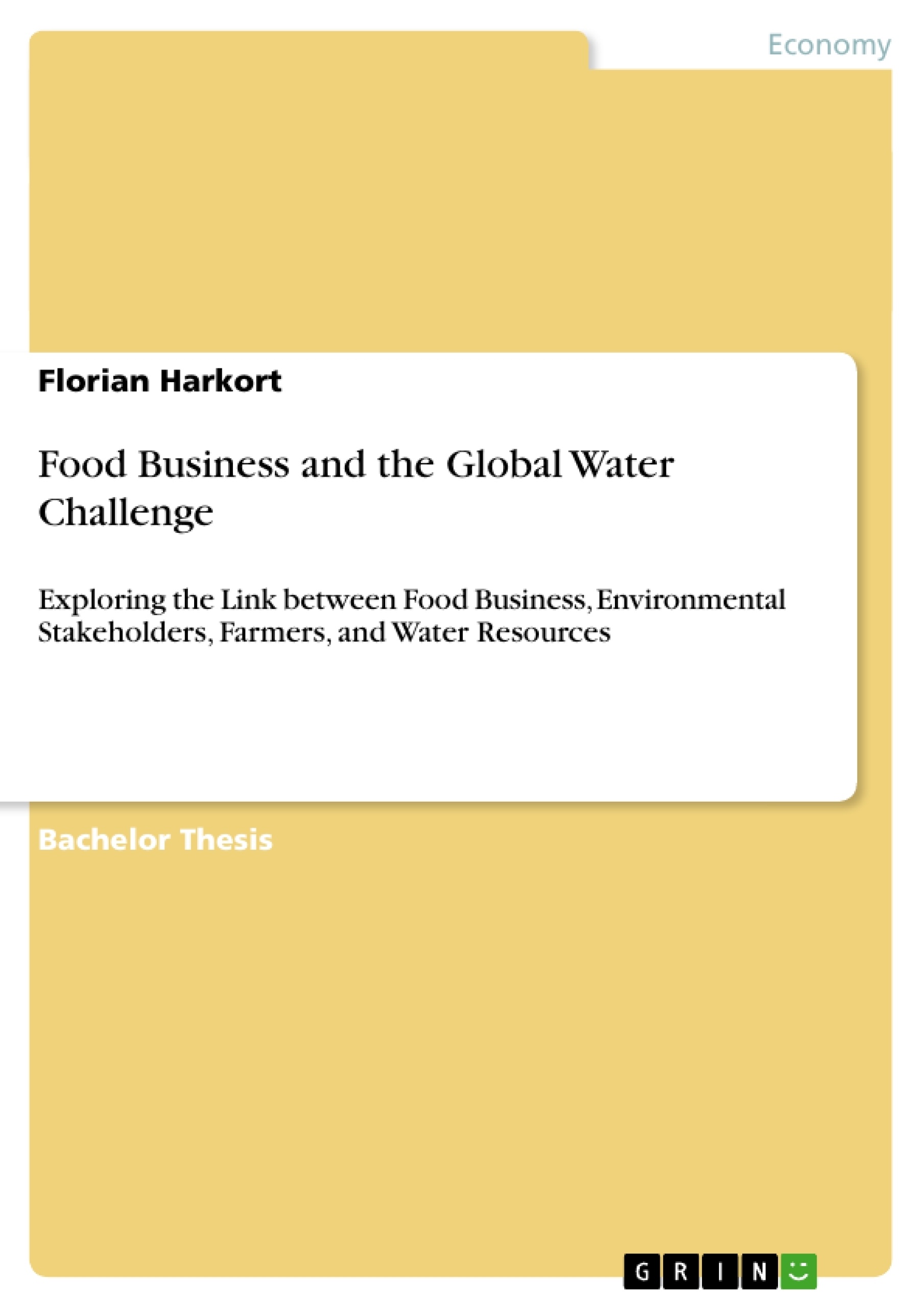In many ways water is of vital importance for humanity. But 1.1 billion people in developing countries today have inadequate access to water. While competition for water increases worldwide, agriculture – the major user of water – is challenged to manage water in a more efficient and environmentally sustainable way.
Meanwhile, the governance of the global agri-food system is undergoing significant changes, thus altering business relationships. These altered business relationships raise questions about the impact of food business on water resources. The central research question of this paper, applied to developing countries, is: Does food business satisfy the interests of Environmental Special-Interest Groups and farmers in efficient and environmentally sustainable agricultural water management, as well as the interests in the related arrangements of relationships?
Drawing on stakeholder theory, the relationships between food business, environmental stakeholders, farmers, and water resources are explored. By transferring the key principles of value creation, dialog, and continuous improvement on food business, critical factors were identified. Value creation, inclusiveness, and accountability are crucial features of relationships with environmental stakeholders, while value creation, fairness, support and compliance are crucial features of relationships with farmers. Two case studies, focusing on Nestlé and GlobalGAP, were undertaken. The study concludes that food business increasingly acknowledges the vital importance of addressing water management in agriculture. The case studies provided a few promising approaches to satisfy the interests of environmental stakeholders and farmers.
Further research must be conducted, in order to assess the particular implications for smallholders. In addition, more transparency is generally needed, to make the effective impact of food business on water resources in global agriculture measurable.
--
Keywords: Water resources, irrigation, food industry, food trade, csr, corporate social responsibility, business ethics, green business, stakeholder dialogue, supply chain, procurement, stakeholder management / Schlagworte: Bewässerung, Nachhaltigkeit, Unternehmensethik, Wirtschaftsethik, Ethik, Verantwortung, Stakeholderansatz, Stakeholderdialog, Anspruchsgruppen, Lebensmittelindustrie, Nahrungsmittelindustrie, Lebensmitteleinzelhandel, Lebensmittelhandel, Handel, Konsumgüter, Supermarkt, Lieferkette, Beschaffung.
Inhaltsverzeichnis (Table of Contents)
- Introduction
- Linking Water, Farmers, and Context
- A Precious Resource
- Rising Competition for Water
- Meeting the Challenges
- The Framework: Stakeholder Theory
- Changes in the Business Environment
- Stakeholder Theory and Relationships
- Linking Food Business, Environmental Stakeholders, and Farmers
- Changes in the Agri-Food Chain
- Linking Food Business and Environmental Stakeholders
- Linking Food Business and Farmers
- Case Study: GlobalGAP
- Background and Significance
- Impact on Water Management
- Relationships with Environmental Stakeholders
- Relationships with Farmers
- Case Study: Nestlé
- Background and Significance
- Impact on Water Management
- Relationships with Environmental Stakeholders
- Relationships with Farmers
- Collaborating in Initiatives
- Conclusions
- Abstract
Zielsetzung und Themenschwerpunkte (Objectives and Key Themes)
This bachelor thesis explores the complex interplay between food businesses, environmental stakeholders, farmers, and water resources. It investigates the challenges posed by the global water challenge and analyzes how food businesses can engage with environmental stakeholders and farmers to mitigate these challenges. The key themes explored in this thesis include:- The importance of water as a precious resource and the increasing competition for its use.
- The role of stakeholder theory in understanding and managing relationships between different actors involved in the food system.
- The impact of changes in the agri-food chain on water resource management.
- The practices and strategies employed by food businesses, such as GlobalGAP and Nestlé, to address water management challenges.
- The importance of collaboration between food businesses, environmental stakeholders, and farmers to ensure sustainable water use in the agri-food sector.
Zusammenfassung der Kapitel (Chapter Summaries)
The introductory chapter sets the stage for the thesis, highlighting the increasing scarcity of water resources and the need for sustainable water management. Chapter 2 delves deeper into the global water challenge, examining factors that contribute to water scarcity and exploring approaches to address these challenges. Chapter 3 introduces the framework of stakeholder theory, highlighting its relevance in understanding the relationships between food businesses, environmental stakeholders, and farmers. Chapter 4 analyzes the dynamic relationship between these actors, exploring the changes in the agri-food chain and the evolving roles of stakeholders in water management. The following two chapters present detailed case studies of GlobalGAP and Nestlé, illustrating the impact of these organizations on water management and their engagement with environmental stakeholders and farmers.
Schlüsselwörter (Keywords)
This thesis explores the intersection of food business, water resource management, environmental stakeholders, and farmers, encompassing key concepts such as sustainability, stakeholder theory, supply chain management, and collaborative initiatives. It examines the challenges posed by the global water challenge and analyzes the practices and strategies of food businesses, such as GlobalGAP and Nestlé, in their efforts to promote sustainable water use. This study highlights the importance of integrating stakeholder perspectives and fostering collaboration to achieve a sustainable future in the agri-food sector.Frequently Asked Questions
How does the food industry impact global water resources?
Agriculture is the major user of water worldwide. Food businesses influence water management through their supply chains, procurement policies, and direct support for farmers.
What is Stakeholder Theory in the context of water management?
It is a framework used to manage relationships between food companies, environmental groups, and farmers to ensure sustainable and fair water use.
What role does GlobalGAP play in sustainable agriculture?
GlobalGAP sets international standards for Good Agricultural Practice, including criteria for efficient irrigation and water protection that farmers must meet for certification.
How is Nestlé addressing the water challenge?
The case study explores Nestlé's initiatives in water management, focusing on collaboration with stakeholders and technical support for farmers to reduce water consumption.
Why is transparency important in the agri-food chain?
Transparency is needed to measure the actual impact of food businesses on water resources and to hold them accountable to environmental and social standards.
- Quote paper
- Florian Harkort (Author), 2008, Food Business and the Global Water Challenge, Munich, GRIN Verlag, https://www.grin.com/document/137229



